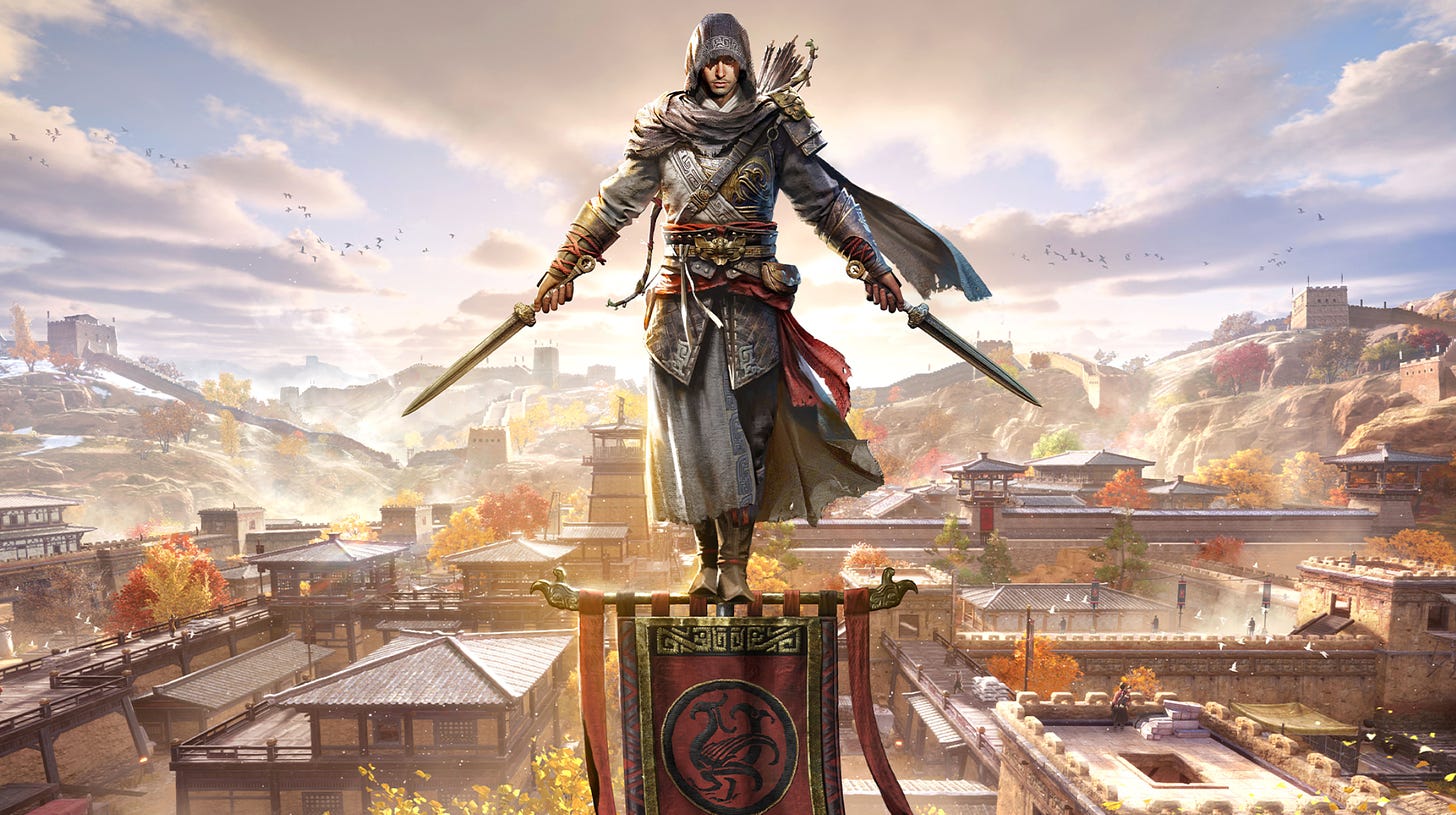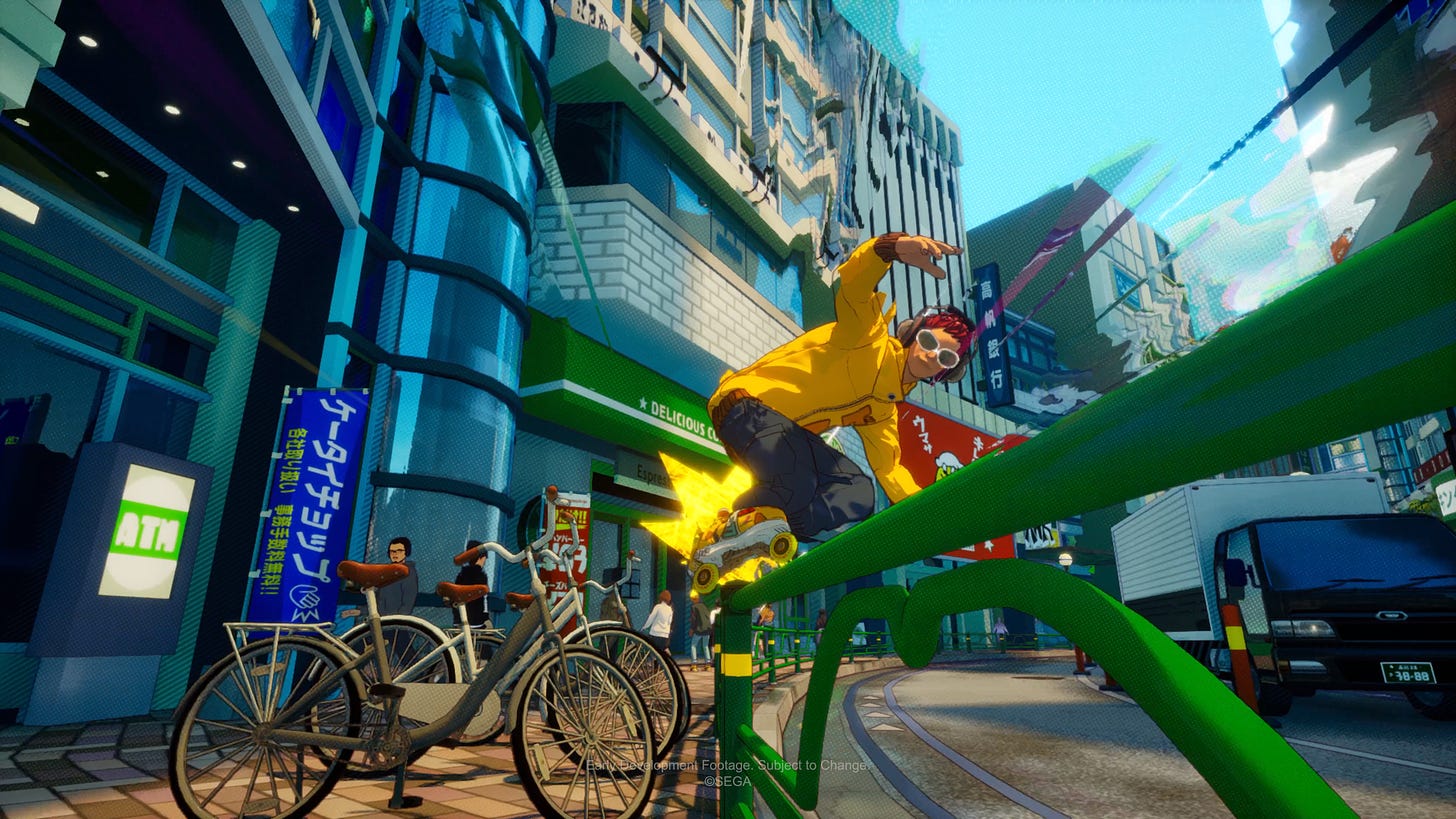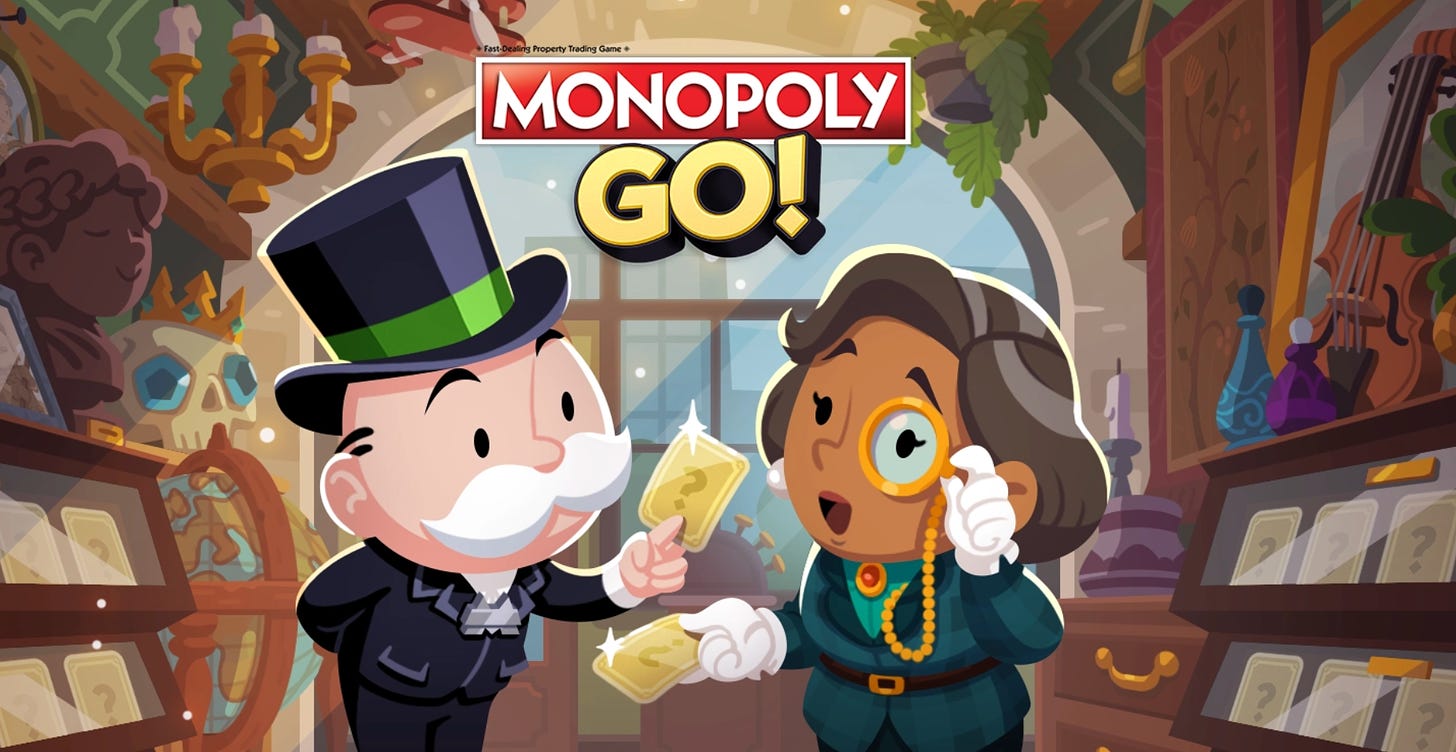A recurring mystery: Who is making that game?
Plus: Mobile gaming's 2023 slump and Sony's unusual CES.

In the summer of 2023, a financial analyst asked Ubisoft executives a seemingly easy question: Who is making the upcoming mobile game, Assassin’s Creed Jade?
Ubisoft had revealed Jade’s existence in September 2022, announcing it as a new mobile AC, set in ancient China. But they hadn’t said who was making it.
In June 2023, Ubisoft showed a new trailer for the game, revealing that it would be published by Level Infinite, a division of Chinese mega-publisher Tencent. Still no news about its developer.
In July, during a quarterly briefing for investors, analyst Nicolas Langlet of BNPP Exane asked who was making Jade as part of a question about Ubisoft’s deal with Tencent
In response, Ubisoft chief financial officer Frederick Duguet said: “In terms of the Assassin’s Creed: Codename Jade project, we will provide the name of the developer at a later stage.”
We don’t appear to be at that later stage yet, even though the public was able to play a test build of Jade last August (players who got in tell me they had a good time but didn’t see any mention of a developer).
A Ubisoft rep had no update for me when I asked this week. Tencent hasn’t said either. The company’s official website for Jade lists publisher Level Infinite, but no dev studio.
The video game industry often obscures basic pieces of information about the studios or individual talents behind new games, wagering that the public doesn’t need to know who is making big video games or doesn’t care.
I’ve long been puzzled and frustrated by this approach, which is why one of the animating topics of Game File this year will be this question of why developers get so little recognition in their own field.
That question has occasionally been the focus of investigations, including by me, of game companies that omit individual developers from the credits of games. That is a serious and worthwhile area of continued inquiry. But it’s also relevant to zoom out and look at how even development teams—entire studios—go unmentioned even as games are introduced to the world.
Ubisoft and Tencent aren't alone in withholding the identity of a team making a major upcoming video game (In fact, Ubisoft is usually better about it. They’re so forthcoming that they’ll list all 11 studios making one of their expected blockbusters).
Consider a recent announcement from Sega.
On December 7 at The Game Awards, the legendary game company debuted a trailer showing footage from five new games, all revivals of classic franchises such as Crazy Taxi and Jet Set Radio. There was no mention of development teams. The next day, Sega of America’s CEO was quoted in The Washington Post saying, of the Jet Set Radio game (and perhaps the others?), “[t]he original creators are involved again.” That week, I asked a Sega rep if they could tell me who is making these new games. Their response: nothing to announce at this time.
Consider Nintendo, and I will be considering them plenty for this topic, as you’ll see in the future.
In June, Nintendo showed a trailer for a Switch remake of the beloved Super Nintendo game Super Mario RPG: Legends of the Seven Stars. The original was made by a team at Square. Who was making the remake? Nintendo didn’t say. I asked them a couple of times before the game’s November release. No luck.
Eventually, fans discovered that the remake studio was a team called ArtePiazza, a group that has worked on many well-received Dragon Quest games. Before that, IGN reporter Rebekah Valentine had also been hitting rocks trying to figure this out. As she had noted…
Square Enix told me to ask Nintendo, and Nintendo said to wait until the game is out and check the credits. Notably, while IGN had the game for review, all this information was locked behind those credits - there was no ArtePiazza logo on a splash screen when you booted the game up, nothing. The general public only found out because someone managed to find it written in very tiny letters in a copyright notice at the bottom of a Japanese pre-order download page. Barring that, an embargo on discussing the game's credits would have prevented anyone reviewing the game from listing the literal co-creator of this game anywhere in their reviews
Side note: Over the summer, I conducted an email interview with Grezzo, a Japanese studio Nintendo has used for many remakes, mostly Zeldas. The studio rarely gives interviews, but Grezzo was making a game called Jet Dragon for Apple Arcade, and Apple was willing to ferry some questions and answers. I asked about Jet Dragon and about the influence of working on Zeldas. The answers from Grezzo founder Koichi Ishii were fine. I also asked if Grezzo was on the Mario project, since they were a likely candidate. No, they said, but it was clear they were uneasy about that being part of the Jet Dragon story. I figured I’d hold it for a piece about the Mario remake’s development mystery.
Second side note: While Nintendo frequently downplays the identity of the teams making their games in trailers or even the games themselves, the company does run in-depth Q&As with many of its development teams on its website, close to their game’s release. Those interviews are an apparent legacy of former company president Satoru Iwata’s unusually extensive and insightful interview series with hundreds of top game-makers from Nintendo and its partners. (Nintendo has not run a Q&A with ArtePiazza).
The short explanation for all of this is that the big-budget part of the video game industry is a publisher-centric business.
At the indie level, it’s not hard to know who is making a game. But above that, gamers’ attention is often directed to publisher names and labels. This is not always the case, of course. Sony isn’t hiding Naughty Dog, Warner Bros. is happy to spotlight Rocksteady, Activision prominently flags which of its Call of Duty teams is leading a given year’s entry in the franchise.
But, as Game File will highlight in forthcoming coverage, figuring out who made the video game you are interested in playing is a complicated process. It’s harder than identifying authors, bands, movie directors or creators in just about any other medium.
If you have thought about this or have insight into how this approach is maintained, I’d love to hear from you.
Item 2: Mobile gaming’s sobering 2023
The once-scorching mobile gaming market has cooled off, according to Data.ai’s new report on The State of Mobile 2024.
Consumer spending on mobile games is down 2% year on year to $107 billion, with downloads down to 88 billion, nearly two billion lower than last year.
The research firm notes a decline in new game releases and players sticking with older games.
In the U.S. the five most downloaded new mobile games in 2023 were Gacha Life 2, Monopoly GO, Honkai: Star Rail, Mighty Doom and Street Fighter: Duel, according to Data.ai. Popular older releases included Roblox, Royal Match and Subway Surfers.
Globally, the biggest mobile genre for player spending was 4x strategy but in the U.S.’ players preferred to pour money into casino/slots.
Mobile gaming may not be what it once was, but it can still draw investment. Second Dinner, the development studio led by lead creators for Blizzard’s Hearthstone and now known for Marvel Snap, said this week they’ve secured $100 million more in funding.
Item 3: 2024’s game industry layoffs are already piling up
While January 2022 was loaded with news of major game industry acquisitions, two years later, the January 2024 trend is news of massive layoffs.
Just this week: Unity plans to cut 1,800 workers or 25% of its workforce, Twitch is slashing 500, or a third, as first reported Bloomberg’s Cecilia D’Anastasio. Both companies already cut hundreds of jobs in 2023.
This morning, Twitch CEO Dan Clancy said in a blog post that the company paid out $1 billion to streamers in 2023 and argued that the Amazon-owned company’s business is strong. But, he wrote, “for some time now the organization has been sized based upon where we optimistically expect our business to be in 3 or more years, not where we’re at today.”
He added: “As with many other companies in the tech space, we are now sizing our organization based upon the current scale of our business and conservative predictions of how we expect to grow in the future.”
Item 4: PlayStation’s latest updates, with no PlayStation chief in sight
PlayStation had 123 million monthly active user accounts in December, a record high, Sony CEO Kenichiro Yoshida said on Monday evening, during the company’s annual presentation at the Consumer Electronics Show. (Recent quarterly averages for monthly active users on PlayStation have been around 107 million.)
Cross-media synergy is still a key talking point: Sony confirmed that writing is underway for Amazon Prime’s “God of War” project and Netflix’s “Horizon Zero Dawn” and showed a glimpse of a live-action adaptation of perspective-twisting PlayStation Vita cult favorite Gravity Rush.
This was Sony’s first CES briefing since 2019 to not include an executive from Sony’s PlayStation division to present an update on its gaming business. In 2020, 2021, 2022 and 2023, Sony Interactive Entertainment President Jim Ryan filled that role. In September, he said he’d be stepping down in March 2024, and overall Sony COO Hiroki Totoki swiftly took on the role of the division’s chairman.
At CES, Sony also showed that its Afeela prototype car with Honda could be driven with a PS5 controller but noted that was just for tech demonstration purposes.
In brief…
🤔 A newly announced AI deal between actors union SAG-AFTRA and Replica Studios is not going down well with some video game voice actors, Eurogamer reports. The union says the arrangement “establish[es] minimum terms and conditions [and] ensures performer consent and negotiation for uses of their digital voice double and requires that performers have the opportunity to opt out of its continued use in new works.”
In September, gaming voice actors authorized SAG-AFTRA to call a strike if needed during negotiations for a new overall contract with the gaming industry. The dangers of AI taking actors’ jobs was a chief concern. Those negotiations have not yet produced a new deal with game publishers.
🎮 Unity and Bungie veteran Natalya Tatarchuk is Activision’s new chief technology officer. Michael Vance, who previously held the position, is shifting to an engineering leadership role, according to a company rep.
👾 YouTuber Matthew “MatPat” Patrick of the popular The Game Theorists channel (18.5 million subscribers) says he is leaving his channel in March and handing it off to someone else, Variety reports.
🗓 This year’s Games 4 Change festival will be held in New York City from June 27-28.
😲 Previews for Suicide Squad Kill the Justice League, out February 2 from acclaimed Batman Arkham development studio Rocksteady, have been underwhelming: “a long departure from its Arkham trilogy” (VGC), “does offer some enjoyably scrappy combat” (Eurogamer), “we played it and didn’t like it” (IGN),
🐍 An online Xbox showcase on Jan.18 (3pm ET) will include the first gameplay trailer for Bethesda’s Indiana Jones game. The action-adventure is being developed by Wolfenstein studio MachineGames, based on a purportedly dazzling concept a decade in the making from Indy super-fan and longtime Bethesda creative lead Todd Howard.







I searched some Japanese sources about the secrecy of game development teams and found this roundtable interview by Denfaminicogamer with several game scenario writers: https://news.denfaminicogamer.jp/interview/210902a
In page two of the interview, the panelists suggest that the risk of talent poaching is one reason why game developer identities are sometimes kept secret. I imagine this is still a relevant concern today. There are also additional comments about the use of outsourced talent and how development companies may try to distance themselves from them because they aren't direct employees.
I learned about two years ago that I should stop following game franchises and I should start following game development studios. You're so right about it being difficult to find who made certain games, I always found this puzzling. I don't care who published the game, I wanna know who MADE it!